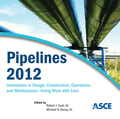Sustainable Flowable Fill
Publication: Pipelines 2012: Innovations in Design, Construction, Operations, and Maintenance, Doing More with Less
Abstract
Flowable fill is used for many applications, but mainly for pipe trench embedment and backfill. There are three ways that using flowable fill can be kind to the environment. Because flowable fill is self-leveling and has a strength greater than the native soil, the trench cross section can be minimized. This means less excavation which means less energy used to excavate the trench, handle the spoil pile, and to backfill the trench. In urban areas, pipeline installation can proceed quicker which means reducing traffic delays, traffic detours, truck traffic, business interruptions, and the impact on the community. Secondly, flowable fill can be made using many waste products or recycled materials. Flowable fill is basically a mixture of cementitious material, aggregate, and water. Admixtures can be used for special circumstances, but are not necessary. Typically, flowable fill is thought of as a mixture of Portland cement, concrete sand, and potable water. It is usually batched at a ready-mix plant, and transported to the site in transit mixers. However, since low strength is a desirable property of flowable fill, materials not usually considered for concrete can be used. Class C flyash, cement kiln dust, and waste by-products of coal fired electricity plants have been used in place of Portland cement. Recycled concrete, Class F flyash, foundry sand, and aggregate plant by-products have been used as aggregate. Using these recycled products and waste materials in flowable fill keeps them out of the landfills. The third way that flowable fill can be sustainable is to use the native soils excavated from the trench as the aggregate in the flowable fill mix. The flowable fill can be mixed using trench-side mixing equipment or portable batch plants that move along with the pipe installation. Using the soil excavated from the trench reduces spoil pile waste, spoil pile handling, importing aggregate materials, and transit mixer traffic from ready-mix plants. Sustainability is achieved through less time for excavation, less handling of soil excavated from trench, less hauling of materials (both to and from construction sites), and reuse and recycling. This all means less energy consumption: In many cases, these reuse and minimizing methods result in flowable fill that can be competitive with compacted earth fill.
Get full access to this article
View all available purchase options and get full access to this chapter.
Information & Authors
Information
Published In
Copyright
© 2012 American Society of Civil Engineers.
History
Published online: Nov 9, 2012
ASCE Technical Topics:
- Aggregates
- Business management
- Construction engineering
- Construction methods
- Earth materials
- Engineering materials (by type)
- Excavation
- Fills
- Foundations
- Geomaterials
- Geotechnical engineering
- Infrastructure
- Materials engineering
- Pavements
- Pile foundations
- Piles
- Practice and Profession
- Recycling
- Sustainable development
- Traffic delay
- Traffic engineering
- Traffic management
- Transportation engineering
- Trenches
- Trenchless technology
- Tunneling
- Tunnels
Authors
Metrics & Citations
Metrics
Citations
Download citation
If you have the appropriate software installed, you can download article citation data to the citation manager of your choice. Simply select your manager software from the list below and click Download.
